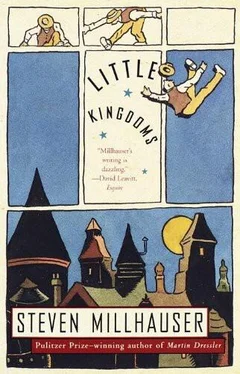It was shortly after the landing on the moon that a deep excitement seized Franklin, for he realized that something extraordinary was going to happen — and yet, was it really so surprising, after all? The footsteps on the stairs were light but not to be mistaken. Stella, screen-enchanted, noticed nothing. The stairs creaked once, then were still; after a while the door opened. She was wearing a spring dress, one that he remembered, and a white flower in her hair. She looked at him questioningly, a little shyly; he was grateful that she said nothing. A flicker of light from the projector played on one sleeve and on her collarbone. She looked about for a moment or two, then stepped to the back of the room, not far from Stella, and silently watched the shimmering screen.
And he was touched that she had come: after all, she had never much cared for his cartoons. That was only proper, for she played Schubert on the piano and had once talked to him on the porch of her father’s house in Cincinnati about the difference between Ingres and Delacroix. He hoped she would like this one, for it was the best he was able to do.
And again he heard a footstep on the stair: he was not surprised. It was a firm step, a confident step — the step of someone who had no doubt about where he was going. After a while the door opened, and Max stood there with a hand in his pocket, the other hand gripping a suit jacket flung over his shoulder. His tie was loosely knotted and his top shirt button undone, and he looked at Franklin with affection and a touch of wryness. Then he removed the hand from his pocket and touched the fingertips lightly to his forehead in salute. He looked quietly about, then stepped to the back of the room, near Cora but not directly beside her.
The first reel came to an end; quickly Franklin removed it and put in the second reel. Max would like this one: he would understand what Franklin had done.
But hardly had the second reel begun when there was another sound on the stair. It was a heavier tread, the tread of someone not accustomed to climbing flights of stairs, and Franklin listened anxiously to the slow, relentless, gradually approaching steps. For although he had not expected anyone else, on this special occasion, still his little group seemed incomplete. Outside the closed door came the sound of labored breaths and a faint asthmatic wheeze. Then slowly the door opened, and in the doorway, wiping his forehead with a large pocket handkerchief, stood Kroll. Yes, it was Kroll — how could it be otherwise? — Kroll with his melancholy, intelligent eyes, Kroll with his chocolate-brown suit jacket stretched to the breaking point across his great shoulders and massive belly, Kroll with a big polka-dot bow tie, evidently purchased for the occasion, for it still had its price tag. It sat a little askew over a triangle of rumpled shirt. Kroll stepped into the room and closed the door softly behind him. And Franklin was grateful that he had come: he wanted Kroll to see what he could do. Kroll had brought with him a metal folding chair with a leather seat, and after a quick glance he set up his chair in the dark between Stella, seated in front of him, and Cora and Max, standing behind him at the back of the room.
Even as Kroll sat down on his chair, allowing his broad hands, with their little black hairs that looked as if they had been combed carefully to one side, to sink gradually into the dark, Franklin became aware of yet another sound on the stairs. It was a pair of footsteps this time, and Franklin felt a sharp tug of curiosity and excitement, for he had thought his little party complete. And although he was not entirely surprised, for nothing surprised him on this special occasion, even so he could not still the violence of his heart as the footsteps reached the top of the stairs. The door opened and the couple entered, first the woman and then the man, their figures a little more stooped than he had imagined, their faces unclear in the dark. But he recognized the bag of knitting with its faded pink flowers that the woman carried over one shoulder, and the old man’s darkroom apron was deeply familiar to him. Arm in arm they made their way to the back of the room, where they stood on the other side, apart from Cora and Max, though Cora, just for a moment, stepped over with a child’s wooden chair and helped the woman sit down. Once seated, she took out her knitting needles but watched the screen without looking away; and his father, standing bent beside her with the fingertips of his left hand resting on the back of the little chair, his cheeks waxy smooth and reddened with rouge, his father, giving off a sweet, disturbing odor of lilies, raised and lowered the extended index finger of his right hand, counting silently as he watched the screen.
And it was good: Franklin was touched that they had come. For they were all gathered now, those for whom his work mattered at all; and what difference did it make if he had to shut it all up in a box, so long as they were here to see it, on this special occasion. They had all been very quiet — Stella had noticed nothing, but sat transfixed beside the projector, her face tense with delight — and as Franklin put in the third reel he was pleased that they would see it to the end. For the voyage was not a collection of separate adventures but a gradual accumulation, a pressure in a direction, culminating in the rhythmic release of the dark side of the moon. And as the cartoon entered its last phase, he felt it was working, despite a few adjustments that would be necessary here and there. He could feel the silent excitement in the room. The end was coming: after a nightmare pursuit through melting moonscapes, by creatures who kept changing their shapes, the boy seized a moon bird that changed into a chalk eraser, and with it he began to erase. He erased the fluttering white moongirl with long moon hair, the moon fountains, the line of moon hills, the white horizon line — and at last he and the monkey stood alone in a black world. Then he turned to the monkey and began to erase him, in quick strokes that sent up puffs of chalk dust. He paused for only a moment before he began to erase himself: first his legs, then his body, next his head. He erased both arms, and now there was nothing left but the fingers grasping the eraser. And so it was nearly done. He had made the voyage to the dark side of the moon, from which no traveler returned. Quickly the eraser extracted itself from the fingers and erased them. Now the eraser began to spin: faster and faster it spun, growing larger and larger, vanishing in a blur, erasing the blackness itself, until there was only a white, blank world, on which the words THE END swiftly wrote themselves. And it was good: he had done what he set out to do. Perhaps he could rest now, for he was very tired.
The reel of film continued to click through the projector as the applause began. It was light at first, a spatter of appreciative claps. But it did not stop: led by Max the applause grew louder, Franklin could distinguish Cora’s swift vigorous claps and Kroll’s little persistent ones, muffled as if he were wearing gloves, but tireless for all that. His mother, standing now, clapped slowly, while his father, still raising and lowering his right hand gravely, struck his left palm against the top of the chair in time to the rhythm of his counting. They were all standing, even Kroll had risen to applaud him in the warm and intimate dark. “Please,” Franklin said, holding up his hands, “this is really, this is really.” Tears of gratitude ran down his cheeks; and as he bowed his head, for he was very tired, the applause grew louder and louder until it was one continuous roar.
The Princess, the Dwarf, and the Dungeon
THE DUNGEON. The dungeon is said to be located so far beneath the lowest subterranean chambers of the castle that a question naturally arises: is the dungeon part of the castle itself? Other underground chambers, such as the storage cellars, the torture chamber, and the prison cells used for detention during trial, are merely the lowest in an orderly progression of descending chambers, and maintain a clear and so to speak reasonable relation to the upper levels of the castle. But the dungeon lies so far beneath the others that it seems part of the dark world below, like the place under the mountain where ogres breed from the blood of murdered children.
Читать дальше












